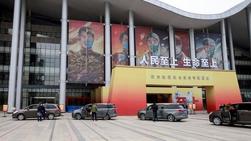 An international expert team from the World Health Organization visit an exhibition on how China fought the coronavirus in Wuhan, Central China's Hubei province, on Jan 30, 2021. (PHOTO / XINHUA)
An international expert team from the World Health Organization visit an exhibition on how China fought the coronavirus in Wuhan, Central China's Hubei province, on Jan 30, 2021. (PHOTO / XINHUA)
SYDNEY - A member of the World Health Organization (WHO) expert team to China said their trip to Wuhan has set the framework for further work in the future, and origin tracing of the coronavirus needs to be done in not only China but other parts of the world.
In an interview with Xinhua on Thursday, Professor Dominic Dwyer from University of Sydney reviewed the Wuhan trip, which he called complex but fruitful.
"It was a very complex process, but all in all we had a very successful review of a lot of literature and a lot of data. Quite a number of conclusions and recommendations that were agreed to by both sides were made. I think it puts together the framework for further work to sort out the origins of this pandemic," he said.
Dwyer said a number of scenarios or hypotheses were developed or have been discussed as to the origins of the virus. Evidence for those possibilities were put together, and then the experts made an interpretation of the available data to say what they thought was most likely.
Based on evidence they had so far, a laboratory leak was highly unlikely, he said.
It was a very complex process, but all in all we had a very successful review of a lot of literature and a lot of data. Quite a number of conclusions and recommendations that were agreed to by both sides were made. I think it puts together the framework for further work to sort out the origins of this pandemic.
Professor Dominic Dwyer from University of Sydney
ALSO READ: What WHO experts say about their month-long Wuhan visit
"We certainly visited the Wuhan Institute of Virology and other laboratories as well. There we discussed the biosecurity protocols, their staff testing, the research on bat viruses and so on. Based on the evidence that we were given, we thought that a laboratory leak was highly unlikely," he said.
Dwyer told Xinhua it was expected that the release of the WHO report would raise questions and there would be different interpretations, but they gave their opinions as independent experts, and they can't necessarily control ho people interpret their work.
The professor said that origin-tracing is difficult and there is more work that needs to be done, and that further studies are needed to continue to investigate the animal origins, or potential animal origins of the coronavirus.
"That's important. That sort of work needs to be done in China but also needs to be done in other parts of the world. I think that approach is quite reasonable."
Dwyer said all countries need to have an understanding of what happened in their countries before they had the first cases, "just in case there were cases that were being missed."
READ MORE: WHO expert team 'granted full access in Wuhan'
He also called for more international cooperation with regard to the future work. In an article Dwyer published in "The Conversation," a publisher of research-based news and analysis, he said the key is to keep trying to work together and avoid the over-politicization of the whole exercise.
"Rather than blaming governments, we need to foster cooperation and trust between investigators, between and within countries. This not only helps us during this pandemic; it's the key to managing future pandemics. The more cooperative we are, the more likely we are to get the best results. We have to make sure politics doesn't muck that up," he wrote then.


